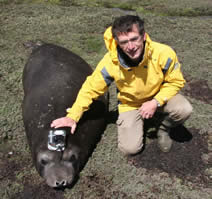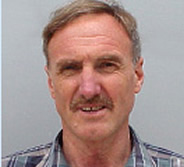Keynote speakers
Abstracts for Keynote speakers presentations can be found here
Dr Christophe Guinet, Centre d'Etude Biologique de Chizé-CNRS, France

Christophe Guinet, currently Directeur de Recherche at the Centre d’Etude Biologique de Chizé-CNRS, France has been undertaking research in the field of marine biology for over 20 years, specialising in the behavioural and foraging ecology of marine mammals. His research in this field began in 1987, when he spent one year in British Columbia, Canada investing the ecology of killer whales. In 1991, he completed his PhD on the behavioural ecology of the Crozet Archipelago killer whales, and then undertook a two-year contract at Oceanopolis, Brittany, to investigate the ecology of bottlenose dolphins and grey seals occurring in the Molène Archipelago. In 1993, he obtained a research position in the seabird and marine mammal research group at CEBC-CNRS focused on understanding the consequences of environmental variability on the foraging and breeding performances of top marine predators, in particular marine mammals. To achieve this goal he is implementing multidisciplinary approaches relying on the use of a broad variety of loggers. Christophe is currently in charge of the French contribution to the international programs Southern Elephant seal as Ocean Samplers (SEaOS) and Marine Mammal Ocean Explorer- Pole to Pole (MEOP), in which over 100 SMRU CTD SRDLs have been deployed between 2003 and 2010, on both male and female southern elephant seals that use Kerguelen for breeding and moulting. He played a key role, with the SMRU engineer in developing the latest generation of seal oceanographic tags incorporating fluoremeter or oxygen sensors. Foraging success of these elephant seals is assessed by a number of methods relying on fine scale analyses on Argos-GPS track, dive, light and/or accelerometers data. On a more applied side he is involved in studying the operational interaction of killer whales and sperm whales with the demersal long line fishing of Patagonian tooth fish. He has published over 100 scientific papers, and supervised 3 post-doc, 18 PhD and 24 master students.
Dr. Sasha Hooker, University of St. Andrews, United Kingdom
Sascha Hooker is a marine ecologist at the Sea Mammal Research Unit at the University of St Andrews, UK. Sascha has been involved in research into the ecology and conservation of marine mammals since 1993. She has three main areas of research: the interaction between marine mammal behaviour and the surrounding environment, the application of this to map and protect productive ocean areas, and the physiological mechanisms underpinning diving behaviour. Sascha received her PhD in 1999 from Dalhousie University, Canada, where she studied the foraging ecology of northern bottlenose whales. She then obtained a post-doctoral fellowship with the British Antarctic Survey working on Antarctic fur seals in South Georgia, and most recently a Royal Society Dorothy Hodgkin Fellowship at the University of St Andrews. She has had a long interest in Biologging, from the trials of trying to attach TDRs to northern bottlenose whales, to the tribulations of using prototype oceanographic and digital camera tags on Antarctic fur seals.
 Dr Ian Jonsen is a quantitative ecologist at Dalhousie University. He is the leader of a lab that studies the role that movement behaviour plays in shaping the population ecology of marine predators. His research focus is on understanding the movement behaviours and distribution of marine predators through the application of state-space models and related analytical methods that reveal hidden patterns in noisy electronic tracking data. The rapid advancement of electronic tracking and remote sensing technologies has yeilded an impressive array of studies that provide important insight into the movements, habitat use and distribution of predators in the continental shelf and open ocean relams. Knowledge of relationships between predator movements and physical ocean processes is lacking but essential for understanding distribution, for informing management policy and conservation programs, and for predicting responses to climate change. Ian was one of the principal investigators on the Census of Marine Life project Future of Marine Animal Populations (FMAP) and he is currently co-investigator on the Ocean Tracking Network (OTN) project, which is conducting the world's most comprehensive and revolutionary examination of marine life and ocean conditions, and how they are changing as the Earth warms.
Dr Ian Jonsen is a quantitative ecologist at Dalhousie University. He is the leader of a lab that studies the role that movement behaviour plays in shaping the population ecology of marine predators. His research focus is on understanding the movement behaviours and distribution of marine predators through the application of state-space models and related analytical methods that reveal hidden patterns in noisy electronic tracking data. The rapid advancement of electronic tracking and remote sensing technologies has yeilded an impressive array of studies that provide important insight into the movements, habitat use and distribution of predators in the continental shelf and open ocean relams. Knowledge of relationships between predator movements and physical ocean processes is lacking but essential for understanding distribution, for informing management policy and conservation programs, and for predicting responses to climate change. Ian was one of the principal investigators on the Census of Marine Life project Future of Marine Animal Populations (FMAP) and he is currently co-investigator on the Ocean Tracking Network (OTN) project, which is conducting the world's most comprehensive and revolutionary examination of marine life and ocean conditions, and how they are changing as the Earth warms.
Dr Graham Robertson, Australian Antarctic Division, Australia

Graham Robertson is a seabird ecologist at the Australian Antarctic Division. After spending half his working life as a botanist in arid Australia he switched to seabirds in the late 1980s when he completed an overwintering study on emperor penguins near Mawson station, Antarctica. Attracted by the conservation imperative, in the early 1990s he broadened his horizons to include research with longline fishing industries on methods to reduce their impact on migratory seabirds. His principal endevour is to develop science-based solutions to the problem of seabird mortality in longline fisheries and embed findings in conservation measures/regulation. He has conducted research on all the longline fishing methods in the world that endanger seabirds - demersal autoline, demersal Spanish system and pelagic. In 2004 he was awarded a Pew Fellowship to research seabird avoidance methods with the Spanish method of deep water longlining. In 2007 he switched to pelagic longline fisheries. He has completed numerous experiments to expedite gear sink rates and is currently working with an Australian engineering company to develop an underwater bait setting system for tuna and swordfish fisheries. That research will come to a head in the spring of 2010 when he will complete a proof-of-concept experiment off Uruguay under worse-case scenario conditions for seabirds.